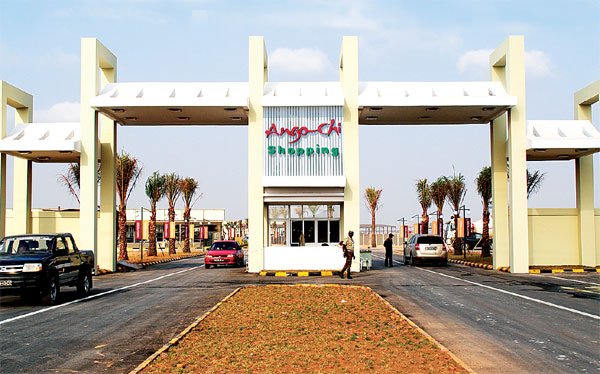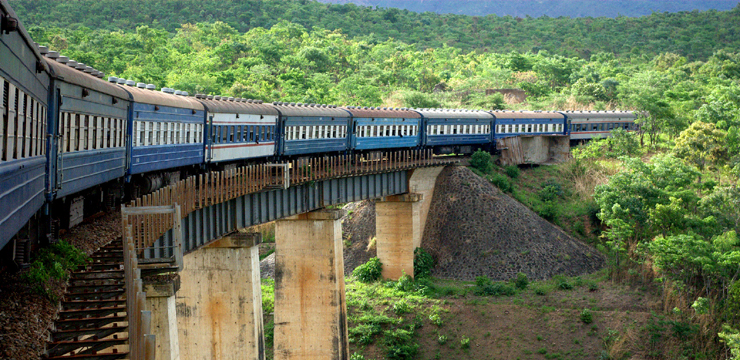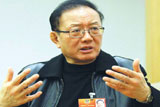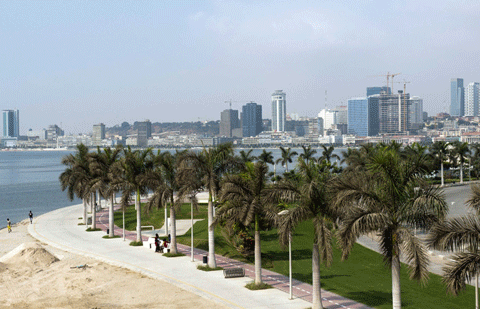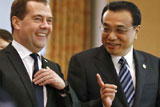
Born to be an entrepreneur
Updated: 2014-02-03 13:50
By Chen Yingqun (China Daily)
Comments Print Mail Large Medium SmallSuccessful Chinese businessman determined to bring innovation
Zheng Gang's first business deal was collecting scattered rice-field eels from villagers, selling them to the market and earning the price difference. He was 8 years old.
Four decades later, his business realm not only stretches around China, but has also taken root in Africa. However, Zheng is no longer satisfied with producing and selling commodities. He is working on a business model by creating platforms that will integrate various resources. He plans to apply the model across Africa.
|
Ango-Chi International Logistics and Trading Park co-developed by Hasan International Co Ltd and local government departments in Luanda, the capital of Angola. Provided to China Daily |
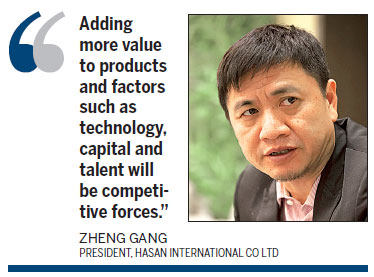
Zheng, 48, president of Hasan International Co Ltd, was one of the pioneers who entered Africa in 2006 to seek opportunities. As more companies enter Africa, he says, the way of doing business there needs to change.
"Just like China, Africa has different opportunities in different periods," he says. "When we first went there, selling clothes, vegetables and daily goods, it seemed whatever you did could make money."
Zheng says that for the past few years, the threshold for entering the market has been lifted, competition has becomes fierce and enterprises' growth patterns have also been changing gradually. For example, profits for some sectors, such as trade and construction engineering, have decreased, while sectors such as real estate and processing are booming.
"Labor-intensive industries will still develop well for a while longer but relying on low labor costs or cheap commodities to make good profits is not as easy as it used to be," says Zheng, also the newly elected vice-chairman of the China-Africa Business Council.
"Adding more value to products and factors such as technology, capital and talent will be competitive forces. Entrepreneurs need to rethink their strategies and business models."
The business model Zheng is building in Africa is actually taking embryonic form in Luanda, the capital of Angola. It is called the Ango-Chi International Logistics and Trading Park, which has been co-developed by Hasan International and local government departments since 2011.
With an investment of $1.5 billion, the park will cover 2.6 square kilometers. A shopping area of about 60,000 square meters is already operating, selling hardware, building materials, electrical equipment, as well as textiles and furniture.
The completed project will not only provide facilities for logistics, production and trading, but also living and office areas. All supporting facilities, including shops, restaurants, exhibition centers, schools, hospitals and a transport center, will be built inside the park by Hasan International.
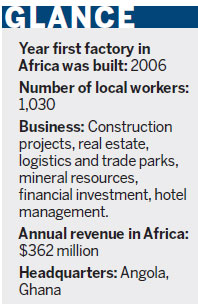
The Ghanaian government also authorized Hasan International to develop a 10 sq km industrial park in Sekondi. The Sekondi Industrial Estate will deal with engineering, development, construction and investment promotion.
Born in a remote village in Nanchong, in Southwest China's Sichuan province, Zheng's business sense became obvious when he was 8, according to Wang Jiwei, editor of the company's journal Hasan's Road.
Because there were many paddy fields in the village, people would snatch rice-field eels from them but, of course, the number each family gathered was limited.
Zheng then convinced them to allow him to collect all the eels and sell them at a city that was 20 km away. When he made some money, he gave the neighbors a certain amount and kept the rest as his profit, according to Wang.
At 19, he left the village to seek opportunities in the city. He sold vegetables, clothes, all kinds of groceries and developed various construction and logistics projects. In 1993, he founded Hasan International, which focused on construction and logistics.
Zheng says he always felt an urge to innovate. This led him to Africa, a land about which he knew very little.
"I was not worried by the harsh conditions in Africa when I first went there. Instead, I soon recognized it was the place where I could show my talent and pursue my dream."
In 2006, his first expeditionary team to Angola comprised 10 tents, 20 building tools and 30 workers.
First working as a contractor for construction projects, the company's business now covers real estate development, industrial park development, mineral resources, international logistics, trade, investment and hotel management. Apart from establishing headquarters in Angola and Ghana, the company also operates in Nigeria, Mozambique and Kenya.
Zheng says that for the past few years, its revenue from Africa has seen annual growth of about 40 percent and, in 2013, it was about 2.2 billion yuan ($362 million). He expects it to reach 10 billion yuan in five years.
Unlike many other Chinese businesspeople in Africa, who earned their first large profits there, Zheng entered the market after accumulating some basic capital in China. He always took a long-term view of his involvement in Africa, expecting his company to become well integrated into society there.
Coming from a poor family, even as a boy Zheng was careful with limited resources and this has helped him develop effective techniques in his African businesses.
"I would like to describe our strategy as a dumbbell," he says. "One side is the big potential of the African market, which offers opportunities we can seize, such as getting projects and setting up channels. The other side is the resources in China, such as capital, talent and technology. Hasan aims to be the transverse bar that joins the two ends."
Zheng now visits Africa four to five times a year. He is prepared to snap up any new opportunities, but what challenges him now is how to build a high-quality international team. He now employs more than 2,000 Chinese and 1,000 locals.
"We have Chinese technicians, African technicians and sometimes Western technicians working together doing programs, but language is one barrier, because some speak Chinese, some English and some Portuguese," he says. "Many technicians have good technical skills, but just cannot overcome the language difficulties."
chenyingqun@chinadaily.com.cn
(China Daily USA 02/03/2014 page16)
